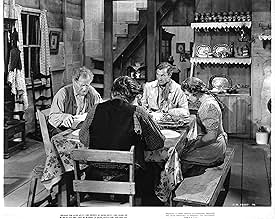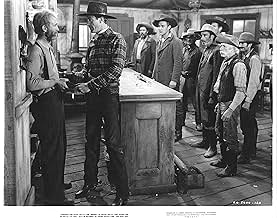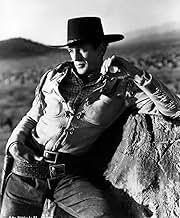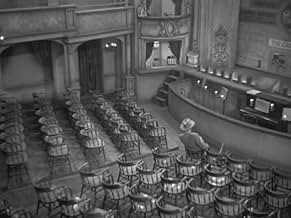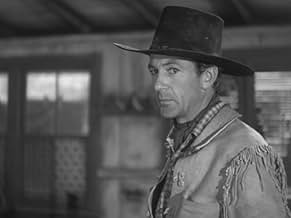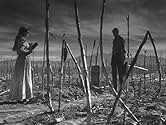NOTE IMDb
7,3/10
7,3 k
MA NOTE
Roy Bean, juge autoproclamé et arbitraire à Vinegarroon, au Texas, se lie d'amitié avec Cole Harden, cowboy itinérant, qui s'oppose à la politique de Bean contre les colons.Roy Bean, juge autoproclamé et arbitraire à Vinegarroon, au Texas, se lie d'amitié avec Cole Harden, cowboy itinérant, qui s'oppose à la politique de Bean contre les colons.Roy Bean, juge autoproclamé et arbitraire à Vinegarroon, au Texas, se lie d'amitié avec Cole Harden, cowboy itinérant, qui s'oppose à la politique de Bean contre les colons.
- Réalisation
- Scénario
- Casting principal
- Récompensé par 1 Oscar
- 5 victoires et 2 nominations au total
C.E. Anderson
- Hezekiah Willever
- (non crédité)
Stanley Andrews
- Sheriff
- (non crédité)
Arthur Aylesworth
- Mr. Dixon
- (non crédité)
Bill Beauman
- Man Getting Haircut
- (non crédité)
Avis à la une
This film focuses on the relationship between Judge Roy Bean and a stranger who rides into his town against the backdrop of conflict between homesteaders and cattle men. While Cooper has one of his best roles, Brennan steals the film in a marvelous performance as Bean that brought him his third Oscar in four years. Cooper and Brennan have great chemistry, and the film is at its best during the earlier parts when the two are engaged in witty banter about Lily Langtry, the actress than Bean is obsessed with. Davenport, who would make only one other film before retiring at age 23, is fine as Cooper's love interest. As usual, Wyler's direction is impeccable.
The Westerner will seldom make it on anyone's top ten westerns list, even one compiled by those of us who haven't succumbed to the garlicky charms of the Man with No Name. But this is one of the top notch hay-consumers of all time, make no mistake.
What can you say about Gary Cooper that has not already been voiced over and over. His beautifully understated acting style, the subtle twitches and raised eyebrows. His bearing. The way he sits a horse, as only someone who grew up on a Montana ranch can. The sure enough Western accent. Had he discovered the ear-pull yet, I didn't notice it in this one. Until watching this movie on a newly restored DVD tonight, I had not seen it in 20 years, and had come to think of it as more of a Walter Brennan movie. I was wrong. Brennan was there with all his fine tools, all right, and he royally deserved his best-supporting award, but that is what his role was. When it's a Gary Cooper movie, it's a Gary Cooper movie. Never having been a fan of High Noon, I had thought maybe Dallas or Vera Cruz were Coop's best westerns. But The Westerner gives us the definitive Gary Cooper.
The movie is handsomely turned out in the sensuously luminous black and white cinematography, fluid editing and silky-smooth scene changes we have come to accept as standard for top studio productions of the late 'thirties, 'forties era, and every cinematic effect is enhanced by a stirring Dimitri Tiomin score. The sets and costumes are superb with a much more authentic look and feel for the old west than most westerns before or since. The clothes of both the men and women, both the cowboys and the farmers, the gun leather, and the buildings, are all unusually accurate to the time and place. Refreshingly, the heroine of our piece, sensitively and strongly played by the beautiful but obscure Doris Davenport, wears a long, feminine dress and uses a wagon for transportation, rather than wearing men's jeans and riding astraddle a horse with her Tangee lipstick blaring as we see in so many great and small westerns. All the other characters, both male and female, come off like real 19th century men and women, not products of the time in which the film was made. William Wyler's direction is virtually flawless with just the right blend of action, tension, and humor. But considering the acting talent, the cinematographers, lighting specialists, art directors, and other technical help any director in the awesomely efficient big studio systems of the time had available, maybe he just knew how to stay out of the way.
What can you say about Gary Cooper that has not already been voiced over and over. His beautifully understated acting style, the subtle twitches and raised eyebrows. His bearing. The way he sits a horse, as only someone who grew up on a Montana ranch can. The sure enough Western accent. Had he discovered the ear-pull yet, I didn't notice it in this one. Until watching this movie on a newly restored DVD tonight, I had not seen it in 20 years, and had come to think of it as more of a Walter Brennan movie. I was wrong. Brennan was there with all his fine tools, all right, and he royally deserved his best-supporting award, but that is what his role was. When it's a Gary Cooper movie, it's a Gary Cooper movie. Never having been a fan of High Noon, I had thought maybe Dallas or Vera Cruz were Coop's best westerns. But The Westerner gives us the definitive Gary Cooper.
The movie is handsomely turned out in the sensuously luminous black and white cinematography, fluid editing and silky-smooth scene changes we have come to accept as standard for top studio productions of the late 'thirties, 'forties era, and every cinematic effect is enhanced by a stirring Dimitri Tiomin score. The sets and costumes are superb with a much more authentic look and feel for the old west than most westerns before or since. The clothes of both the men and women, both the cowboys and the farmers, the gun leather, and the buildings, are all unusually accurate to the time and place. Refreshingly, the heroine of our piece, sensitively and strongly played by the beautiful but obscure Doris Davenport, wears a long, feminine dress and uses a wagon for transportation, rather than wearing men's jeans and riding astraddle a horse with her Tangee lipstick blaring as we see in so many great and small westerns. All the other characters, both male and female, come off like real 19th century men and women, not products of the time in which the film was made. William Wyler's direction is virtually flawless with just the right blend of action, tension, and humor. But considering the acting talent, the cinematographers, lighting specialists, art directors, and other technical help any director in the awesomely efficient big studio systems of the time had available, maybe he just knew how to stay out of the way.
This intelligent Western contains many a wily comment on the savage mindset of frontier times. Walter Brennan as Judge Roy Bean thoroughly deserved his Academy award though it beats me why he picked up a supporting Oscar instead of a full one. After all, his part is about as long as Gary Cooper's. That aside, Gregg Toland's photography is a gem and the dialog well ahead of its time. The best thing about it all, though, is Wyler's disciplined direction. Yes, some would argue that the film does not accurately reflect history, that Judge Roy Bean died much later and not in a shootout but frankly there is enough prejudice, malice, and quirky humor in this film for one to know outright that Wyler never intended it as a historical account but, rather, as a comment on the difficulties of bringing law to the West. Some of it might be dated but Brennan will startle you, Cooper is darned slick, and it will keep you riveted. Don't miss it!
I saw the film again after a gap of 25 years recently, and it really is as good as i remembered it. So good in fact it almost made it into my list of top ten westerns. Everything about is top notch-the performances, the photography, the humour and the screenplay. It is only let down by the contrived ending. The fight scene between Cooper and Tucker is as realistic as you will see anywhere, and the scene where Cooper cuts off a lock of Davenports hair is erotically charged. Of course the two main plusses are the performances of Brennan and Cooper-each fills the frame with their presence even when they have no lines, and Brennans portrayal of Judge Roy Bean results in one of the more memorable characters in westerns. In the hand of another actor the result could have been a caricature but Brennan treads the very thin line between parody and homage perfectly.
"The Westerner" (1940): Directed by William Wyler, starring Gary Cooper and Walter Brennen. On one level, this is a classic tale of the Old West as it struggled through a transition of re-settlement. Depicted as such, it is a beautifully photographed, well acted, gritty, weird, funny, and emotional story. But, this film was also made in 1940. The Germans had begun their sweep across Europe, they were breaking treaties as fast as necessary, and non-militarized countries could not withstand the armed renegade country bent on following no rules but its own. To think that this was not on the minds of "The Westerner's" writers, directors, and audience, would be naïve. It's a perfect representation of current events in Europe, England, and America as of 1940. (1941 would change that.) I found it fascinating from this perspective watching it with something of the same gut level understanding that people in that time would have certainly felt. Cooper was the outsider who had no real attachments and wanted to remain isolated keeping his freedom and avoiding entanglements. The town, run by despot Judge Roy Bean, made their own laws, convicted everyone in their way, and hung them without a second thought. The farmers were seen as an impediment to their expanding ideas which required more and more land and water. Cooper was drawn into the battle of ideologies, and attempted to become the ambassador aiming for peace, not war. He moved slowly, and lost the trust of everyone until it was made very clear to him that the aggressors had no intention of honoring promises. It was time to take sides. It is PERFECT representation of that, and our (we, the Westerners), time.
Le saviez-vous
- AnecdotesGary Cooper never liked the film and said, "You can't make a western without a gunfight." He walked off the film and refused to start work on it. It was only after long battles with Samuel Goldwyn that he started work on it but always said that he wished he'd never made it.
- GaffesThe town was named for George Langtry, an engineer and foreman who had supervised a Chinese work crew building the railroad, and not for the actress Lillie Langtry.
- Citations
Judge Roy Bean: Mr. Harden, it's my duty to inform you that the larceny of an equine is a capital offense punishable by death, but you can rest assured that in this court, a horse thief always gets a fair trial before he's hung.
- Crédits fousOpening credits: "After the Civil War, America, in the throes of rebirth, set its face West where the land was free. First came the cattlemen and with them "Judge" Roy Bean, who took the law into his own hands, administering justice according to his lights. That he left his impress on the history of Texas is tribute to his greatness. Then into his stronghold moved another army, the homesteaders, who ploughed the soil, fenced in fields, to bring security to their wives and children. War was inevitable, a war out of which grew the Texas of today."
- ConnexionsFeatured in Hollywood: The Great Stars (1963)
Meilleurs choix
Connectez-vous pour évaluer et suivre la liste de favoris afin de recevoir des recommandations personnalisées
- How long is The Westerner?Alimenté par Alexa
Détails
Box-office
- Budget
- 2 000 000 $US (estimé)
- Durée1 heure 40 minutes
- Couleur
- Rapport de forme
- 1.37 : 1
Contribuer à cette page
Suggérer une modification ou ajouter du contenu manquant

Lacune principale
By what name was Le cavalier du désert (1940) officially released in India in English?
Répondre
